|
Versión en español
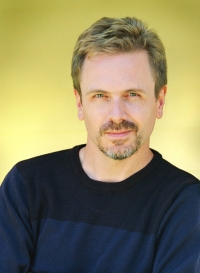 Interviewing
this 39 years old New Yorker is a challenge for BSOSpirit. After
knowing him at First
Conference on Movie Music at Úbeda (Spain)
and being elected as next Honorary President we have said all
about his category as human being. The challenge consist in looking
for the equanimity with someone who is already a member of our
family. We hope to reach this objective with this interview and
you know better this man and his next projects. Interviewing
this 39 years old New Yorker is a challenge for BSOSpirit. After
knowing him at First
Conference on Movie Music at Úbeda (Spain)
and being elected as next Honorary President we have said all
about his category as human being. The challenge consist in looking
for the equanimity with someone who is already a member of our
family. We hope to reach this objective with this interview and
you know better this man and his next projects.
Madrid, September
2005
BSOSpirit (BS): Could I speak to John
Frizzell, please?
John Frizzell (JF): Hello,
it's me!
BS: Hello
John, are you ready for the interview?
JF: Yes,
I am.
BS: You started in this soundtrack business
with Keys, a TV project. How did you involve
in this particular work?
JF: In
fact, my first true work as a composer, the very first score I wrote
on my own, was VR.5. I got the job by an appointment
of the series producer, John Sacret Young, who
contacted my agent. It was a funny experience. With Keys,
I finished my work, a promo, in about ten days. I worked on a synthesizer,
adding only a little bit of flute and vocals to it.
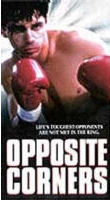
BS: Opposite
Corners was indeed your first work for the big screen.
This movie was about boxing sports. Currently, with Four Minutes
, you seem to go back to sports stories, which are known to require
powerful soundtracks in order to capture the emotion of the film.
Did you think of something different for these sports movies,
when coming to write the score?
JF: Opposite Corners wasn't
only my first score for a film, but the first time I came to work
with an orchestra. Would you like to know who the conductor was?
BS: No
idea.
JF: Marco Beltrami.
BS: Was
he?
JF: True,
he helped me to get along with this first challenge. Going back
to your question, in sport films one has to deal very well with
a difficult notion such as “victory”. What does it really mean?,
for whom? I love the way some sports films become unpredictable
at the end, like Million Dollar Baby. So yes,
it's valuable to try something different in these movies.
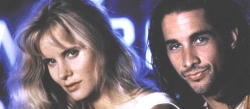
BS: You
first solo score, series VR.5, passed in the 90's
without much success, but it became a “cult” title later on. Your
music in there was very experimental.
JF: I
wanted recognition, so I worked very hard on that project; I used
jazz-like compositions, some pieces closer to classical music, and
some different aspects to proof myself in the craft of making film
scores.

BS: In
1996 you worked for director Eric Red, a cult name
in horror movies. Did you come to know him well?
JF: We
worked together in Undertow, a thriller-movie.
It was a strange experience. Eric and the film
producer were arguing all the time in order to take control of that
movie, and I felt a little out of side.
BS: That
same year you joined James Newton Howard for the
first time in The Rich Man´s Wife. Am I right?
Because many think you never met before Dante's Peak.
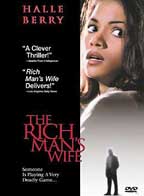
JF: The
Rich Man's Wife was my first job in a big studio. At
that time I already knew James, because we had been friends for
at least two years. He planned to write a main theme for that
movie, and then asked me to write a score for the performing sequences,
which I did. The situation was exactly equal in Dante's
Peak, so we worked again in the same way.
BS: Were
you free to propose your own creative ideas?
JF: You're
never free at all when composing music for the movies. You always
have to adjust to timings or specifications made by someone else.
But my experience in those two movies was really remarkable. I learnt
a lot about Newton-Howard's music, about the score writing process
and the importance to achieve a good main theme. I tell you, it's
very hard to score a scene without a main theme in mind. James taught
me how to pursue this main-theme resource.
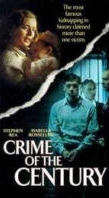
BS: Crime
of the Century was a TV-film very praised by the critics,
thanks to a good script and a very good performance of Stephen
Rea and Isabella Rossellini's. You came
with it to score a drama. Does a drama need any different approach
than a comedy or an action score?
JF: Don't
forget the director's touch; it was Mark Rydell,
a specialist in dramas. It was certainly a very brilliant film,
and I used cello and piano sounds to make it touching. Producers
hadn't enough money to hire an orchestra, so I had to forget about
violins and write a score in very low keys. I learnt, then, that
when you don't have the resources you wished you had, the only way
is to become creative and take a lot of profit from a few things.
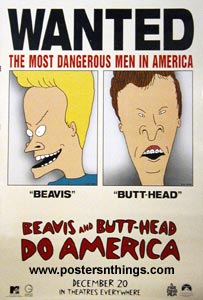
BS: Again,
in 1996, you worked in the film Beavis and Butt-Head Do
America, which took profit from this MTV animated
duet success. Your music, nevertheless, seems too much serious to
match with this kind of comedy.
JF: Well, there
is a story about that score. It was my first comedy, so I went to
ask master Elmer Bernstein on how to score a comedy,
the way he did with Airplane!. He told me that
one should always approach to a comedy soundtrack as if he wouldn't
be the chosen composer, like hanging around. I was struck by this
opinion, but I followed his advice. The opening sequence looked
like a King Kong movie, with strong orchestrations,
but I think it matched quite well with Beavis and Butt-Head mad
adventures.
BS: Was this soundtrack any opportunity
to enroll in more animation projects?
JF: I'm
not sure, because the film wasn't a typical animation movie; so
wasn't my score, I guess.
BS: You also put the
music to back such an absurd animated guy as King of the
Hill. How did you come to work for this TV-series?
JF: They
asked me to prepare an occasional episode, and I had fun putting
music to it.
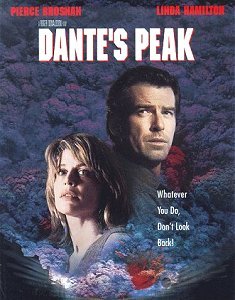
BS: You
began to be well known among soundtrack composers in 1997, after
scoring Dante's Peak ...
JF: It
was a sort of challenge for me. We are talking about a big film,
with a lot of money put in it. There was a lot of pressure on the
crew, and I was asked to have the score ready in almost a month.
The reason was that the producers wanted it to be on the big screen
before Volcano, so the making of that film was
like a race. I had to work hard, and I remember walking sleepy each
morning like a zombie, because of my intense activity.
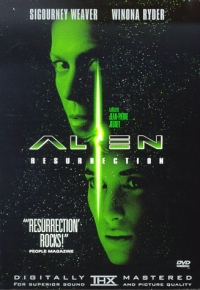
BS: 1997
was really an intense year, from Dante's Peak to Alien:
Resurrection. It must not have been easy to be in the shoes
of Jerry Goldsmith or James Horner in
order to score a movie about this well known alien monster...
JF: Part
of it was just serendipity. Daniel O'Bannon happened
to be a friend of mine, and he encouraged me to become involved
in the making of that picture. He wrote continuously to director Jean-Pierre
Jeunet about my work, and ask me a kind of promo. Jeunet was
himself very upset when he got it, and wanted to know where the
hell I took the script of the movie from... “I have never seen
the script”, I replied. He insisted that my music was so well
adapted to the scenes of the script that he immediately agreed to
use it. I was lucky...
BS: But it might be impossible
to elude a comparison with the previous scores by Goldsmith or Horner.
JF: Unfortunately,
many people judge the music of the scores without thinking about
the film they were put in. You cannot separate film music from
the film itself. Alien: Resurrection had not
the impact that previous Aliens had, but I tell you that producers
made a lot of money through copies on video and DVD. In the end,
it really became a success, and I'm proud of the part I took in
it... Jerry
Goldsmith is the greatest film score writer that ever
existed. I didn't pretend to improve his musical concept of Alien
. I just did my job, humbly. 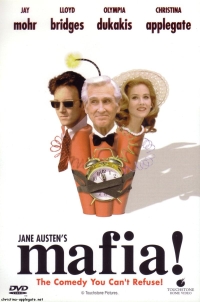
BS: Your
continuing soundtrack was Jane Austen's Mafia,
Jim Abrahams ' comedy of that year...
JF: Bill Badalato was
the producer of Alien: Resurrection. Later on
he decided to produce as well Jane Austen's Mafia.
He said he immediately thought about me for the score. It was
a funny experience.
BS: And then you seemed to
be very happy scoring comedies...
JF: As
far as I remember, I've only done four comedies... I wish
I could score them more often.
BS: In 1998,
however, you started a kind of horror-movie saga with I Still Know What You Did
Last Summer, continuing with Thirteen Ghosts and Teaching
Mrs. Tingle.
JF: Those
were very scary films, particularly Teaching Mrs. Tingle .
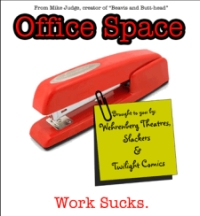
BS: Office
Space, again a comedy, must have had interrupted your
scary inspiration.
JF: I approached that score
with a lot of delicacy. In fact, many of the scenes and dialogues
didn't need any music, so my work tried to be very subtle.
BS: Going
back to Teaching Mrs. Tingle, that film allowed
you to work with director Kevin Williamson. Did
you start a good relation with him?
JF: Kevin
was a funny director, and also a sensible man. At the time the film
was ready to be shown, the nation was shocked by a killing which
took place in a school near Columbine... The title of the film was
first Killing Mrs. Tingle, but it was finally changed
because of that mass-murder. 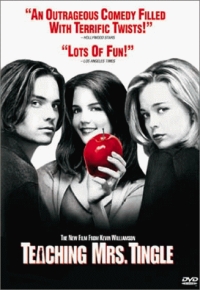 I was asked to change the tone of the
film with my music, which was a very attractive challenge to me. I was asked to change the tone of the
film with my music, which was a very attractive challenge to me.
BS: They
edited two CDs about that film: one with songs and another one
with your own music. Are you happy with this double edition?
JF: We
are not the owners of the film rights, so producers can always
do what they want. In the 90`s soundtrack records got a very good
position in the music market, but all this changes when Internet
became the main source of music to many people. Then, producers
needed to add a commercial value to the soundtrack records, what
they did by putting songs in it.
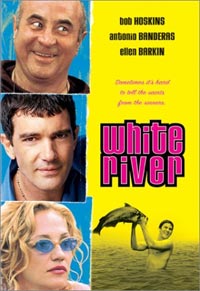
BS: Our
fellow citizen Antonio Banderas was involved in
a film you came to score: The White River Kid.
JF: I
enjoyed making music for that film, diving into bluegrass music,
with fiddles, and banjos, and harmonicas... I still watch this movie
some times, late at night, being showed by HBO,
and I feel happy about it, the score that I created for that particular
purpose.
BS: In the year 2000 you scored a TV-film
called Possessed. Can you comment on the soundtrack?
JF: I
suppose it was a strange music, because it was written in a very
strange mood. I was asked to do the score in about a week, just
after both my parents died (two weeks before). I tried to work
on it without realizing really what I was doing... Now I should
watch it again and understand why it sounds like it does.
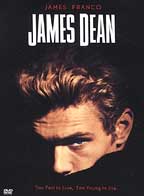
BS: James
Dean was another big TV-project by James Franco.
Your score looks very urban, modern, with a jazzy taste. Why did
you choose jazz sounds for this score?
JF: James Dean had
much to do with what jazz is all about. His times were times of
great jazz music, so I clearly wanted to write a score based on
jazz music. I also did some investigation on the subject, and
found that James Dean loved jazz very much. This was one of the
scores I'm most proud of. It's a lonely, sad, melancholic sound.
BS: Why
wasn't it released in a CD, then? Can there be an edition in
a near future?
JF: I
hope it will be released some day. In fact, I've spoken to the
TV people and they seemed quite interested.

BS: Star
Trek Enterprise is a TV-series with many musicians involved: Brian
Tyler, Mark Mckenzie, Jay Chattaway, Dennis
McCarthy... How did you join in?
JF: They
called me for an episode, and I was very happy to contribute to
this great saga.
BS: Are you a trekkie?
JF: Not
really, but I enjoyed very much working in the series... I occasionally
watch some chapters as well.
BS: A lot of soundtrack
lovers think Thirteen Ghosts is one of your
best scores. However, don't you think that film was too much
noisy to enjoy the music parts?
JF: But
it was challenging, exciting. I had a good time writing it.
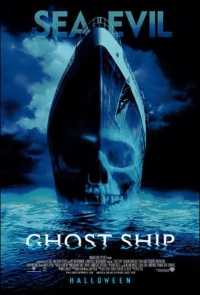
BS: Ghost
Ship was a kind of Thirteen Ghosts product,
but I think the scores cannot be compared. Ghost Ship presents
epic themes, horror sounds, stressful atmospheres and one of the
greatest leitmotivs you have ever composed: "The
Souls Ascend"...
JF: My idea with Ghost
Ship was to use romantic music, the result was indeed
very different from Thirteen Ghosts. To work
with the same director and the same producers does not imply that
you have to make the same music.
BS: Gods
and Generals is one of your fans favorite soundtracks. Randy
Edelman, nevertheless, had a similar experience with Gettysburgh and
happened to be also in this other film. Did you decide to do it
all together? 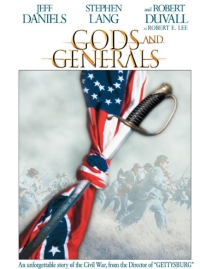
JF: Randy
was going to score the film, he was the first option. But he was
also hired to score another film so he hadn't time to complete all
the music needed. It was actually Randy who called
me to work on the rest, and I was very thankful to do it. I also
made good friends with the crew on that movie.
BS: You
hired a famous violinist, Mark O'Connor, and
a whistle and pipe player, Paddy Moloney (The
Chieftains)...
JF: Paddy only played
one piece, but is a central piece in all the film. Mark is
an amazing musician, sometimes difficult to deal with, because
he's very talented and can improvise ten different themes to include
(all of them perfect) in a single scene, making it hard to decide...
Those were very great musicians, and I was very glad to meet them.
BS: You
choose singer Mary Fahl for “Going Home”, and Bob
Dylan wrote the closing song for a remarkable album...
JF: Well,
the songs were great, but I didn't choose them. It was the director's
choice.
BS: Do you consider Gods and Generals your
best score until The Price Winner of Defiance, Ohio?
JF: Yes.
That score changed my work and my career as a composer. Somehow,
I became more mature.
BS: But this “mature” John
Frizzell also took part in scoring Looney Tunes:
Back in Action. What part did you create? Did you
meet Goldsmith and Debney?
JF: I
did the beginning of the film, a six minute scene starting
the road-runner. Unfortunately, I couldn't meet Goldsmith or Debney,
because they worked on it later than me.
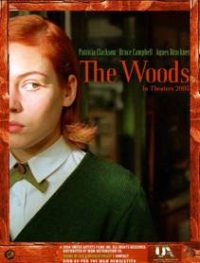
BS: The
Woods will be next Lucky Mckee's movie,
the blockbuster director of May. You happened
to play some parts of this score in Úbeda. Will this score
be different from other scary-movie scores written by you in the
past?
JF: I approached a bit the score of Thirteen
Ghosts, using those strange sounds to create and back
the films intentions.
BS: How was your relationship
with Mckee?
JF: In
fact, I wasn't the chosen composer for this film, but he couldn't
finish and McKee asked me to join in and do my
job. It's a little tricky situation, because I changed the former
music ideas, and the technical crew seemed to depend then on what
I was preparing. But I must say that Lucky is
a very talented director, and I like his work very much.
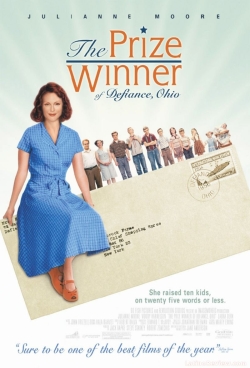
BS: In BSOSpirit we
had the honor to listen to The Prize Winner before
the film has been showed, as a premiere. The music was really good.
JF: Director Jane
Anderson asked me to be very subtle with the music, so
I wrote very melodic pieces. I did some piano demos to Jane
Anderson, and we both decided what themes would be more
adequate for each scene. I spent more time than usual in preparing
the music, and I think it will be my best.
BS: The
score is very rich in moods, standing from very calm tunes, Thomas
Newman -like music, to more powerful themes.
JF: That's
the approach I made, it's just what I wanted and what the film
deserved. It was a pleasure to put my music in a film of this
superb quality.
BS: We
think that score can be candidate to some awards. Will the film
have enough promotion?
JF: Yes
it will. Dreamworks is willing to promote The
Prize Winner among the best films of the year.
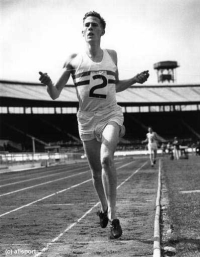
BS: Four
Minutes is your last written score up to date, going
back to the sports action. It tells the story of the one mile
record man, Roger Bannister. What elements have
you incorporated in that score?
JF: The story
goes back to England in the 60s, and I deliberately chose a sort
of religious hymn as the main theme, adding percussions in the
fast running scenes.
BS: Is Four Minutes as
good as The Prize Winner?
JF: The Prize
Winner is my proudest work, but Four Minutes will
clearly work on TV, many people will like the sweet story with
the powerful scenes.
BS: And
the last question... We know you enjoyed a lot our soundtrack meeting
in Úbeda last summer, because you'll come
next year as the honorary president. Could you then address some
words to soundtrack lovers?
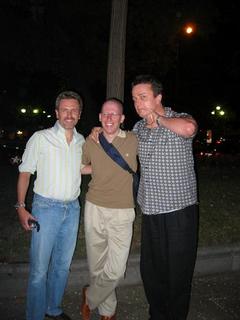
JF: I
had dinner with Sean Callery last Friday night,
and we both felt how nice it was to be able to meet with soundtrack
listeners and share their opinions and their ideas, the feed-back
think of our creative works. We all feel inspired of you appreciation.
You are all part of our music.
BS: That's all John.
Thank you for your attention. We will keep in touch, preparing
the next conference on movie music at Úbeda.
JF: My pleasure. Don't forget his official website: www.johnfrizzell.com
Interview
made by Jose Luis Díez Chellini
Questions by David Doncel
Transcription by Jordi Montaner
|





